Foam insulation in Canada, specifically spray foam insulation, fills spaces or cracks with isocyanate and polyol resin, which becomes solid wherever it is installed.
It has high thermal resistance (R-value) and air-sealing qualities to reduce heat loss and increase energy efficiency in the home. This, in turn, converts to savings on energy bills throughout the year.
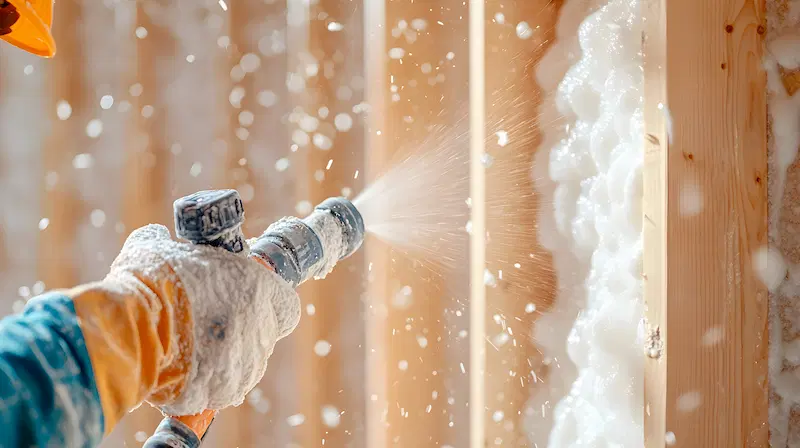
Insulating foam offers thermal and sound insulation. This means that it stops the loss of heat energy and sound energy from travelling inside and outside.
If you want to improve energy efficiency in your home, find the best foam insulation contractors near you.
Just fill out the form on this page to receive FREE and NO-OBLIGATION quotes to compare and save money.
How Does Foam Insulation Work?
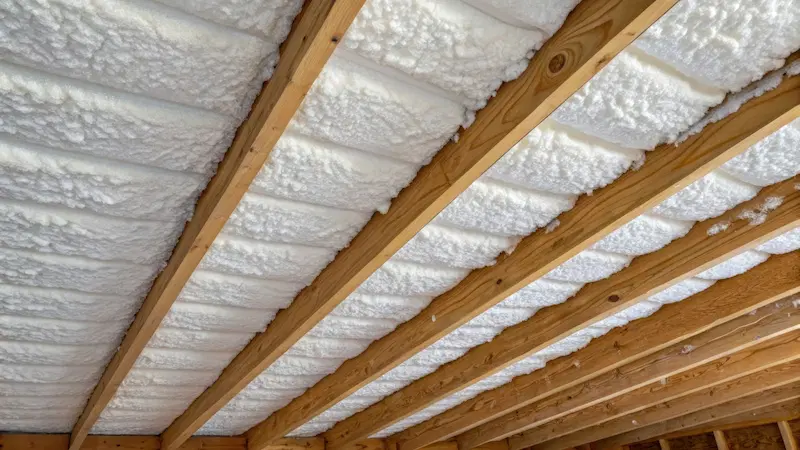
Foam insulation creates a thermal barrier and air seal, effectively reducing heat transfer and preventing air leaks.
This is done by expanding and filling cracks and gaps to trap the air. The material has low thermal conductivity.
As the foam expands, it also creates a tight seal and prevents air from circulating to reduce drafts and air leaks.
This helps to maintain consistent temperatures inside the home and lowers energy consumption.
Certain kinds of foam insulation are water-resistant and prevent moisture to stop mould growth.
What are the types of Foam Insulation?
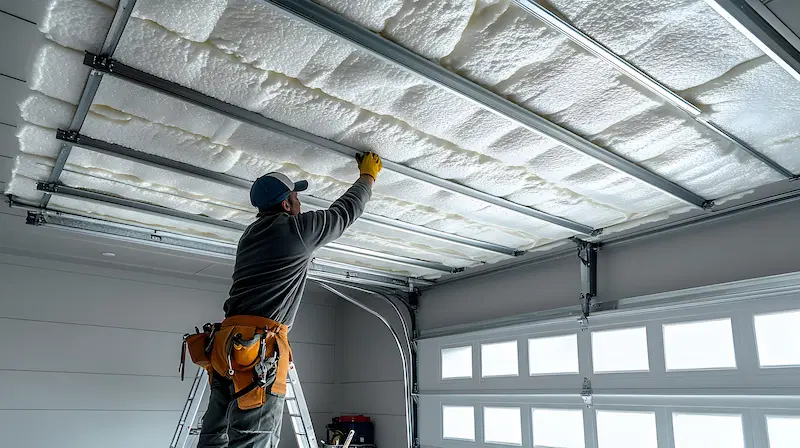
Foam insulation comes in two primary types: spray foam and foam boards.
Spray foam has 2 categories: open-cell and closed-cell.
Foam boards include options like polyisocyanurate (polyiso), expanded polystyrene (EPS), and extruded polystyrene (XPS).
Spray Foam Insulation Types to Consider
- Open-Cell Foam: Has soft, flexible, and spongy texture. This allows vapor permeability and is suitable for interior walls and soundproofing.
- Closed-Cell Foam: More density and rigidity. It has a higher R-value and acts as an insulator and a vapor barrier. It is suitable for attics, exterior walls, and basements.
Foam Board Insulation Types
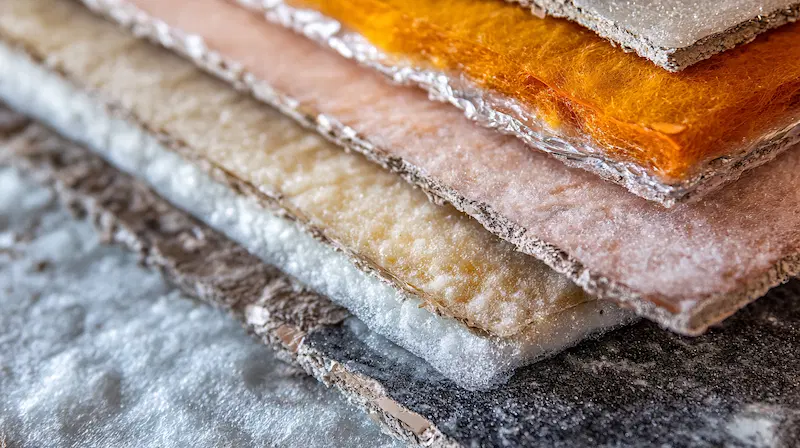
The most common types of foam board insulation includes Expanded Polystyrene (EPS), Extruded Polystyrene (XPS), and Polyisocyanurate (Polyiso or ISO).
EPS has low density and is cost-effective while XPS has a higher R-value and comes in green, blue, or pink colours.
Polyisocyanurate, or polyiso for short, boasts the highest R-value in its category, making it the top choice for insulation, especially in roofing applications.
Where is Foam Insulation Used in the Home?
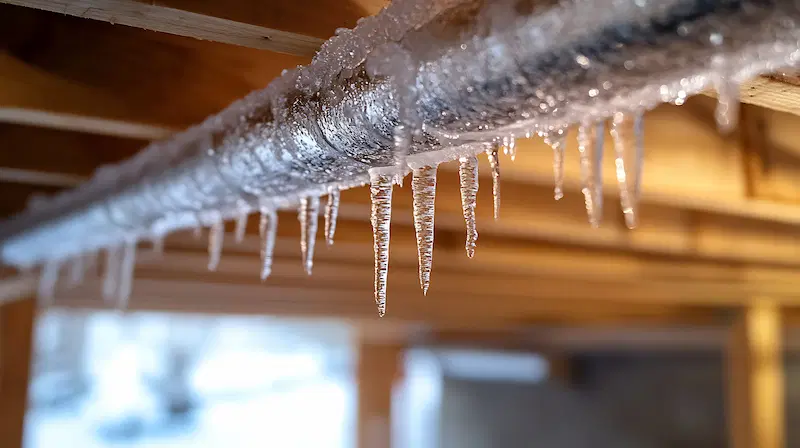
Foam insulation can be used to improve energy efficiency in the following areas in the home:
- Attic: To stop heat loss and increase HVAC system’s efficiency
- Basement & Crawl Spaces: To resist moisture and insulation
- Walls: To lower energy bills
- Garage Ceilings: To prevent heat transfer in transitional spaces
Which is better – Spray Foam or Foam Board Insulation?
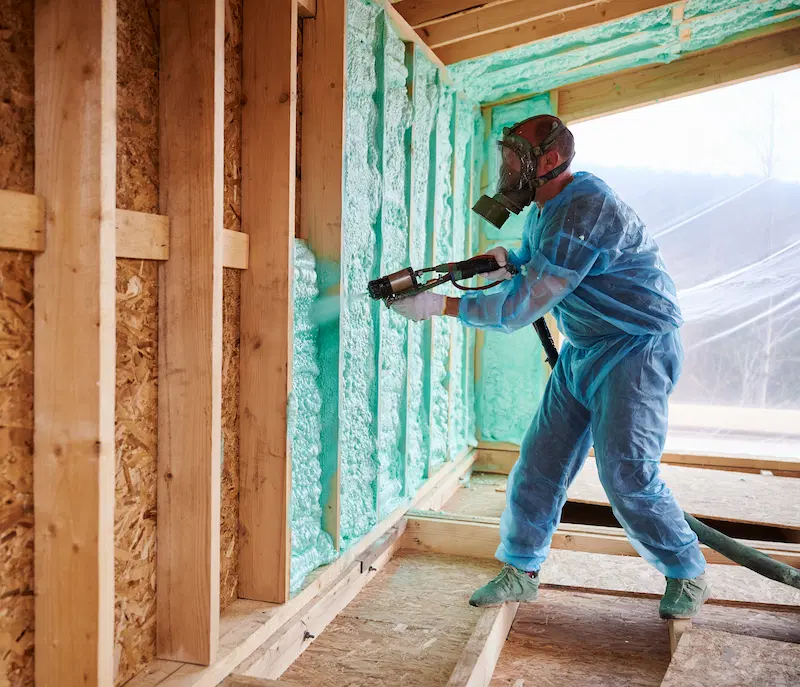
Spray foam is usually considered better than rigid foam board for insulation because of its higher air sealing properties energy efficiency.
Spray foam can fill even tiny gaps to create an airtight seal.
Rigid foam board can have gaps between the panels, thus resulting in reduced efficiency. However, rigid foam board is more cost-effective and easier to install in new buildings.
To help you make the right choice, consider the following:
Spray Foam is ideal if:
- You need high performance in tight spaces and hard-to-reach areas.
- If you have extreme temperatures or high humidity in the home.
- If you prefer high-quality air sealing and long-term energy savings.
Foam Board if:
- Insulating huge flat areas like foundation walls or under slab.
- If you have a tight budget or want a DIY option.
- You want a rigid material that adds structural value.
Spray Foam has a higher cost and requires professional installation. Rigid Foam Boards, in contrast, are cheaper and can be installed DIY. They have lower R-value and can be prone to moisture if not sealed properly.
Proper foam insulation can lower energy bills by up to 40%. In the end, the best choice really depends on your budget, needs, and the requirements of your project.
What is R-Value and Its Importance?
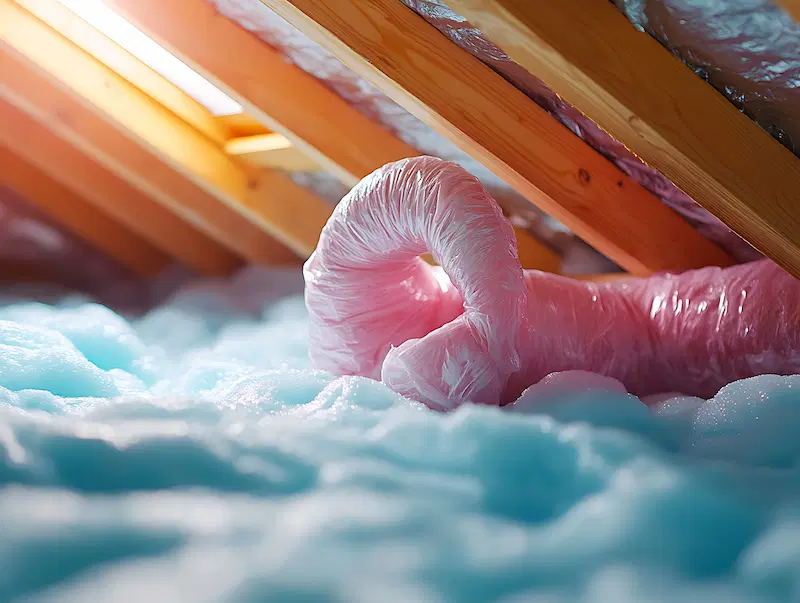
R-value is critical for choosing the right insulation for your home. It tells you how well insulation can stop heat transfer.
By understanding its importance, you can choose the right insulation material for higher energy savings.
R-value measures insulation’s resistance to heat transfer. It will tell you how effective the insulation type is in maintaining stable indoor temperatures.
This estimation will take into account the type of material, thickness, and density, which are important for determining effectiveness.
R-Value vs Insulation Performance
Higher R-values indicate higher thermal resistance. This means less heat loss in winter and less heat gain in summer. Choosing insulation with the right R-value is crucial for comfort and energy savings.
Consult qualified and reputable insulation contractors in our network to compare insulation materials with high R-value for maximum benefits.
Spray Foam vs Rigid Foam Board: Compare R-Values
A comparison of spray foam and rigid foam board will show you their level of performance: performance:
| Type of Insulation | Typical R-Value per Inch | Applicable For |
| Spray Foam | 5.5 | Roof, walls, attics |
| Rigid Foam Board | 3.8 – 5.0 | Basement walls, foundations, exterior applications |
- It is easy to see, based on the R-Value per inch, that spray foam insulation provides better performance.
- However, foam boards can still be efficient for certain areas and are DIY-friendly.
How much is Spray Foam Insulation?
The cost to install spray foam insulation varies based on certain factors such as the type of foam, thickness, size, and contractor’s rates.
To help estimate your budget, below is a breakdown for your reference:
| Type of Foam | Price per Board Foot | Price per Square Foot (2” Thickness) | Description |
| Open-Cell | $0.45 – $0.70 | $1.00 = $1.50 | Good for interior walls |
| Closed-Cell | $1.00 – $1.50 | $2.00 – $3.00 | Has higher R-value |
**Board foot = 1 square foot at 1 inch thickness
What is the average cost per project?
| Area | Average Cost |
| Basement (1,000 sq. ft.) | $2,000 – $6,000 |
| Attic (1,000 sq. ft.) | $3,000 – $7,500 |
| Rim Joists | $500 – $2,000 |
| Garage Wall | $1,500 – $3,000 |
You must also take into account several factors when estimating the cost of foam insulation:
- Location: Cities Toronto or Vancouver have more expensive labour rates.
- Thickness: Thicker foam means higher prices.
- Access Issues: Tight spaces may increase the cost.
- Prep Work: Cleaning, and the removal of existing insulation can increase the total cost due to time and labour.
To plan your budget, get multiple quotes to compare so you can get the best insulation solutions for your home at the lowest possible price.
Best Foam Insulation Contractors in Canada
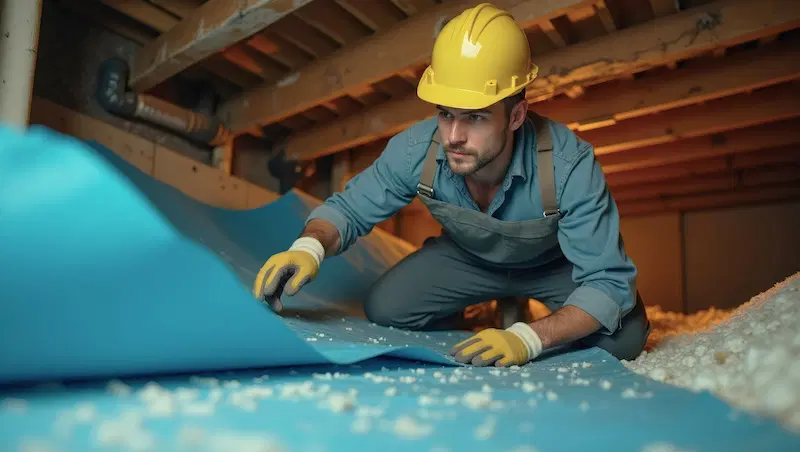
Locating a reputable and experienced foam insulation contractor is critical for maximizing energy efficiency and ensuring value for money.
You will want to ensure a safe installation and long-term performance at a good price.
Here are some popular spray foam insulation companies in Canada offering good customer service, quality installation, and competitive prices.
1. Foam It Canada – Ontario
- Serves Toronto, Mississauga, Hamilton, and surrounding areas
- Popular for good customer service, professionalism, and eco-friendly spray foam products
- Specializes in residential and commercial insulation, attic, and crawl space insulation
2. Great Northern Insulation – Ontario
- Serves London, Barrie, Kitchener, and the rest of Southwestern Ontario
- One of Ontario's top insulation companies
- Specializes in Spray foam, blown-in insulation, and energy audits
3. Caliber Quality Solutions – Alberta
- Serves Edmonton, Calgary, and Red Deer
- Specializes in closed-cell spray foam with excellent R-value ratings
- Works on new construction, basements, and retrofit projects
4. EcoComfort Insulation & Contracting Inc. – Greater Toronto Area
- Popular for attic upgrades and home foam insulation
- Specializes in Spray foam, attic insulation, and mold remediation
5. Thermo Solutions Insulation Inc. – Quebec
- Serves Montreal and surrounding areas
- Offers consultations and competitive prices
- Specializes in open- and closed-cell spray foam, and other energy efficiency upgrades
6. Eco Spray Insulation – (Canada)
- Operates in many provinces in Canada
- Has certified installers and eco-friendly products known all over Canada
- Specializes in residential and commercial insulation applications
How do you choose the best insulation contractor for your home renovation? You can compare multiple insulation contractors serving your area using our short online form!
Save time by using one online form to receive FREE and NO-COMMITMENT quotes.
Top FAQS regarding Foam Insulation
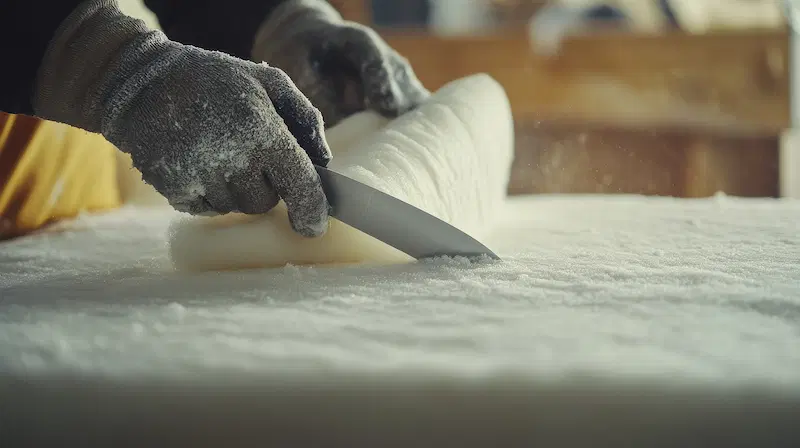
As a homeowner, it is essential to know important details about foam insulation before starting project.
We have gathered some popular questions and answers to serve as your guide.
What are the benefits of foam insulation?
Spray foam insulation offers numerous benefits including airtight sealing, draft prevention, and energy savings. You can maintain steady temperatures inside your home with efficient foam insulation.
Foam insulation also serves as a moisture barrier to prevent mildew and mould. You will surely experience more comfort in the home and enjoy lower energy bills.
Is spray foam insulation cost-effective?
Spray foam insulation provides multiple benefits. With proper installation, you can observe an immediate reduction of your HVAC system. If you use a closed cell foam insulation, you won’t require a vapor barrier.\
How long does spray foam insulation last?
You will be happy to know that spray foam installation can last for decades with proper installation. Unlike other insulation materials, spray foam does not lose its R-value as time goes by.
For this reason, choose the right foam insulation contractor to do the work in your home to get maximum durability.
Can I do Spray Foam Insulation as a DIY Project?
The application of Spray Foam Insulation requires proper training and equipment. Although DIY kits can be found in some stores, it is better handled by professionals.
You can cause damage to your property or waste resources by installing it yourself. If you want to save money, find the best price for spray foam insulation by comparing multiple quotes from our network.
What are some of the benefits of using foam board insulation?
Foam board insulation is easier to install than spray foam, making it more suitable for DIY projects. They are also lightweight and durable and cost less than spray foam.
Do you have other questions that are not covered by these FAQS? The best thing to do is to connect with our insulation partners who will be happy to send you FREE quotes to compare. They can also answer questions about your insulation needs in more detail.
Tips When Choosing your Insulation Contractor
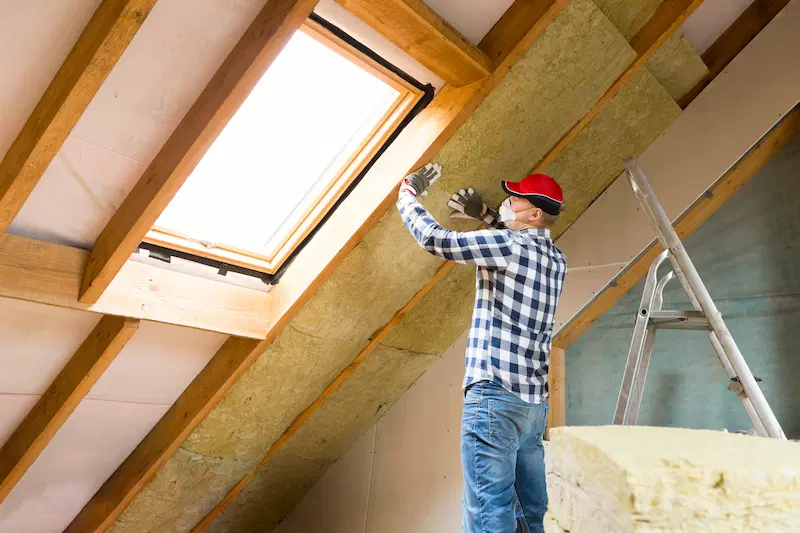
The insulation of your home is very important to your comfort as well as the cost of heating and cooling your home.
Unless you are an expert at construction, you may have the mistaken belief that all insulation materials and contractors are the same. The truth is they are not.
For this reason, it is important to compare multiple contractors to choose the right one who will deliver high-performance insulation for your home at the right price!
Don’t hire just any contractor to do the work without first verifying their certifications, insurance, and experience. Most importantly, request multiple quotes for comparison so you don’t overpay for your project.
Get started by filling out the short online form below to receive FREE QUOTES from our reputable insulation partners.



